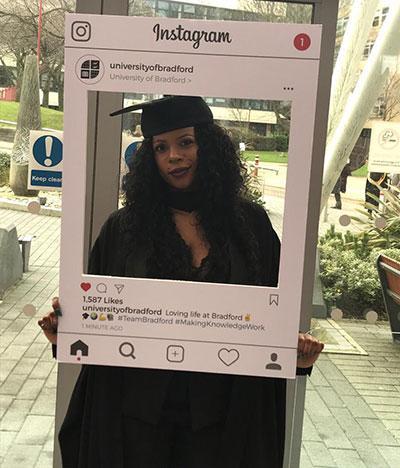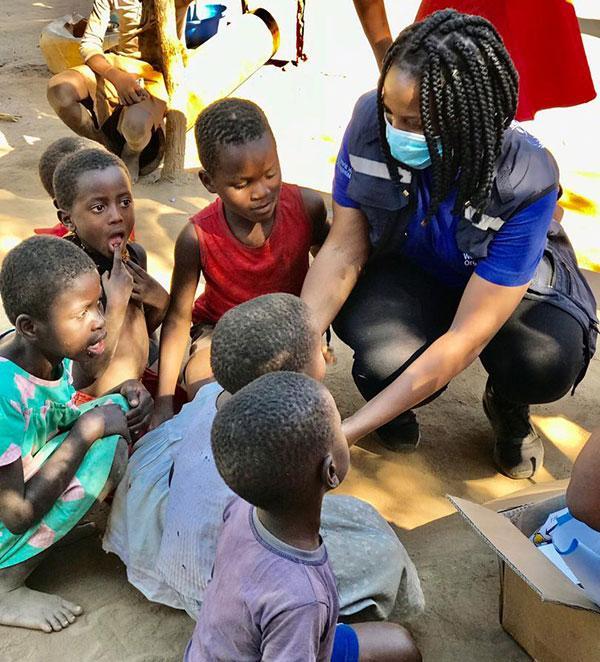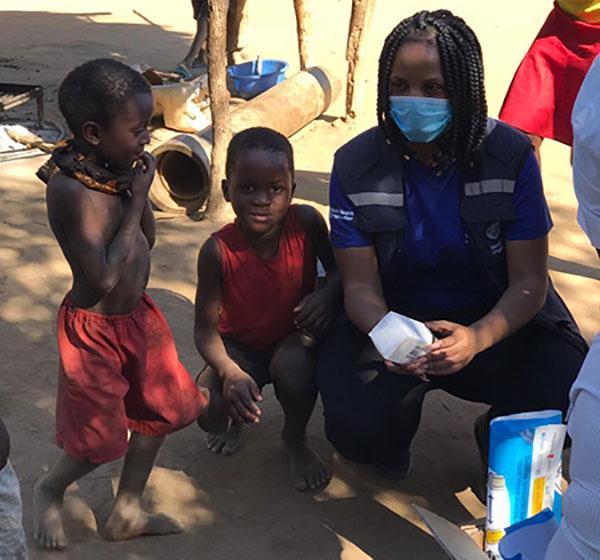Tatenda Chimbwanda
MA International Development Management
- Communications Officer at World Health Organisation Zimbabwe
- Responsible for developing high-profile multimedia communication campaigns
- Chose to study at Bradford due to the facilities and teaching methods on offer

My current role
"I am responsible for developing the World Health Organisation's (WHO) high profile multimedia communications campaigns including during the Covid-19 emergency.
"Some of my key duties and achievements include developing the WHO social media communication strategy and Covid-19 visibility strategy, including the dissemination plan, key message development and the social media calendar.
"The best part about my job is how fulfilling it is. I get to give back to my community through service. Being able to go back to the community that raised me and watch people's lives get changed by things such as getting access to medication and vaccines really warms my heart and gives me a great sense of job satisfaction.
"I work in a culturally diverse environment. I also travel a lot and meet people across Zimbabwe and people from all parts of the world.
"The worst part about my job is how overwhelming things can get, especially in times of emergencies and travelling to remote communities - spending close to six hours on the road can be straining. Also, being a UN staff member means l have to watch how l carry myself even when l am off duty."
Studying at Bradford
"I chose to study at the University of Bradford because the facilities they offered for my subject were second to none. The teaching methods allowed me to explore course materials further and gain experience in interpersonal communication and research, which I think are vital assets for development practitioners.
"The Bradford Centre for International Development (BCID) has over 40 years of experience of teaching and research in Development Studies and a great reputation for my subject. Courses are taught and designed by staff who are actively engaged in real world projects including for corporate businesses, international organisations, non-governmental organisations and the local community. Some of the professors have worked in developing countries, so they speak from experience.
"l also liked the way my course was taught and structured. Bradford offered modules such as Issues in Development Theory and Growth in Development, which set it apart from other universities. Bradford also has a strong international reputation."
I definitely feel the scholarship is one of the things which makes my CV stand out. l get called into interviews which require more years of experience than l have simply because l have a Master's degree and l got a scholarship.
Scholarship support
"I received the Global Development scholarship. I learnt about this scholarship through a website called scholarships.com. I subscribed to the newsletter and l got emails on scholarships in the UK. It was not hard to apply but I did have to apply for the course l wanted and be accepted first.
"After that, l wrote my motivational letter and answered the set questions and applied via email. The process was simple in comparison to other applications l have done before. The scholarship helped me tremendously and l would have not got my Master's if it was not for it. The scholarship covered my full tuition fees and living expenses.
"There is no way my family could have afforded to pay that much money for me to study abroad. Where l come from, having a roof over your head and food is honestly the most important thing. Anything else is a luxury.
"My advice to anyone applying for a scholarship is to not give up. I first applied in 2014 and didn't get it and l applied again in 2015 and did."
Finding work
"After l graduated, l was looking for jobs within the civil society sector as that is where my most of my experience was. My approach to finding work was to apply for as many jobs as l could which obviously matched my work experience.
"The minimum requirement for my job was a bachelor’s degree and a minimum of three years’ experience. However, a Master’s degree and previous work experience with the UN was an added advantage. I found out about this job through an ex colleague from UNICEF. She posted the job advert on her WhatsApp status and l just applied.
"I have honestly lost count of the amount of applications l sent off. I think it was about 200 and l was only called for maybe six interviews. l was applying for jobs in Zimbabwe which has approximately 80% unemployment rate and it took me six months to get my job.
"If you really want something, you should never give up. I wanted to do my Master's in 2014 but l couldn't afford it and l applied for the Global Development scholarship and l didn't get it. I never gave up because l knew if I got it, it would open doors for me in the future. Then, after graduation l was unemployed for close to six months. However, l kept on applying until l landed my first job after graduation with UNICEF Zimbabwe.
"At times, l still feel like l am living in a dream as l am now working for one of the greatest organisations in the world."

The best advice l can give is do not give up and apply for jobs as many times as you can. You should also try and volunteer as experience is very important within civil society organisations.
Choosing my sector
"I chose to work in this field because as a little girl l had always wanted to work for the United Nations and helping others has always been something l was passionate about. I have always wanted to work in this field and to anyone who dreams of anything, words are very powerful. I am a living testimony of how powerful words are and the fact that you can become what you constantly tell yourself.
"The biggest inspiration to my career has always been the late Kofi Annan. I have always told myself that we came from the same continent and that if he can do it, so can l. I have always dreamt of becoming the first African female Secretary General for the UN, just like Kofi Annan. My friend's mother also worked at UNICEF when l was growing up and it really inspired me every time l visited her at work. I would tell myself l wanted to work here and l worked hard for it and years down the line l actually started my career in the UN with UNICEF.
"My role has not drastically changed due to Covid-19, as WHO is supporting the government’s response. The biggest change would be the fact that l have to work from home most of the time and l cannot go to the field as much as l used to and talk to people in the community. As a communications officer, most of our activities have had to change and we focus more on digital communications, meaning we cannot have our usual traditional activities such as public exhibitions."

Bradford expanded my horizons in ways l could never imagine. I was born and raised in Zimbabwe and studying at Bradford also gave me an opportunity to experience life in a developed country.
Pursuing postgraduate
"I chose to continue with my studies as l started my career with the UN and having a Master’s degree is usually the minimum requirement for most of the jobs. I was never interested in studying for my Master's until a year into my career which made me interested in specialising in international development.
"I was certain that if I didn't complete my MA, I could never have the opportunity to achieve in my career. The MA International Development Management prepared me to work in development agencies or international NGOs such as the United Nations and The World Bank. I thought that pursuing a career in international development would provide me the opportunity to help improve the community's developmental needs and learn about their basic needs.
"Bradford is the reason why l have a job with WHO today. Most people have experience in Zimbabwe. However, they do not have a Master’s degree from an international institution which is extremely highly valued within the UN system.
"The environment at Bradford is friendly and welcoming to people from any background. l enjoyed my student life and l stayed near campus and l would walk to class - it was easy."
